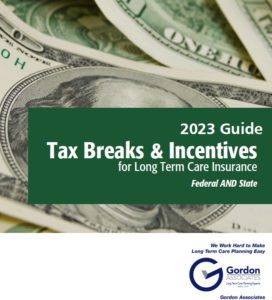Long Term Care costs can be very expensive for someone who has a major health problem and needs help with Activities of Daily Living (ADL) – bathing, dressing, toileting, transferring, continence and eating. Health insurance and Medicare do not cover this type of chronic care. Often the need for home care, assisted living, skilled nursing or adult day care arises, and you need to decide how you will pay for these Long Term Care costs.
Options for Covering Long Term Care (LTC) Costs
There are many factors to evaluate when determining how you will cover LTC costs. The following are some options to consider –
1. Self-Funding
Do you have a substantial amount of assets saved for retirement or other future needs? If you can spare it, that money may be needed to cover LTC costs for you or a loved one.
You can estimate LTC expenses with a financial advisor or Long Term Care Insurance expert. According to a recent Genworth Cost of Care survey, the national median cost for 44 hours a week (around six hours a day) of assistance or care in a private home setting is $4,300 a month, or nearly $52,000 a year. The cost for care (in a facility or home) can reach $100,000 or more a year. This amount can easily double if you need home care 24/7.
Today’s Social Security recipients receive, on average, $1,500 a month in benefits, or just under $18,000 per year. In the case of a couple receiving double the average benefit, that still only equates to an average of $36,000 a year.
Many baby boomers will need significantly more than this amount during retirement. When you consider the typical older adult couple may spend more than $10,000 per year just on traditional healthcare costs (Medicare Premiums and Supplements, copays, prescriptions, etc.), you can see that social security alone will not stretch too far. The additional cost of in-home LTC services would dramatically increase the average retiree’s expenses, potentially running through their budget and retirement savings.
2. Medicaid
Medicaid, a joint federal and state public assistance program for financing health care for low-income people, pays for health care services. People who have very high medical bills relative to income and assets may be eligible for Medicaid.
Medicaid covers certain health care services, including nursing home care. Eligibility is usually based on income and personal financial resources. To qualify for Medicaid you may have to spend down your assets. Medicaid benefits may vary by state. To find out the eligibility requirements in your state, you can visit Medicaid eligibility or contact Gordon Associates.
3. Continuing Care Retirement Community (CCRC)
Continuing Care Retirement Communities, also known as CCRCs or life care communities, are a LTC option for older people who want to stay in the same community through different phases of the aging process. It is a good idea to understand requirements for admission and if it is affordable.
When you apply to CCRCs, they ask for your financial records to confirm you have ample assets to pay for your ongoing care. If you do not have a huge nest egg, but you do have Long Term Care Insurance, it may help. For example: the CCRC you are considering requires $500,000 in assets, but you only have $300,000. However, you have a LTCI policy that pays $200,000+ in benefits (approximately $4,000 per month for five years). This could be considered an asset and allow you to qualify for the CCRC you are considering.
CCRCs typically provide at least three options of care: independent living, assisted living and skilled nursing care. Residents first move in on an independent-living basis, whether in an apartment or other residential setting. Once they start to need care, they can move to the appropriate level of care within the same building or campus.
Continuing Care Retirement Communities typically offer at least three types of contracts:
Type A – Lifecare Contract – Requires the highest upfront fee, plus monthly payments. However, they include all levels of service for no or little additional cost once you utilize them. In short, you pay more when you are healthy to offset other expenses later.
Type B – Fee for Service Contract – You pay less for your independent living expenses, but you will pay separate, higher fees once you move to higher levels of care.
Type C – Modified Contract – Essentially a blend of A and B. Some care services are included—and charged for—initially, but other services are billed separately once they are utilized. This contract typically includes a limited number of free days of Health Care Services. After these days are exhausted, additional days are discounted based on current market rates.
If you are considering moving to a new community, do your homework and get recommendations. Visit each community you are considering to see what is best for your lifestyle and budget. If you are considering moving out of state, look into the cost of living in those areas.
4. Long Term Care Insurance
Long Term Care Insurance (LTCI) will help pay for Home Care, an Assisted living Facility and Nursing Home Care. It pays for services some people will need as they age, become ill, when they have a serious accident or when they need help with the activities of daily living (ADL’s – bathing, dressing, continence, transferring, eating and toileting). LTCI will also pay for care if the policyholder has a cognitive impairment (Alzheimer’s or Dementia).
To qualify for LTCI and purchase a policy, the carriers will look at your health history to determine if you are eligible. The LTCI expert you meet with should ask you for detailed health information, such as height and weight, tobacco use, recent hospitalizations, medical conditions, current medications, surgeries performed or recommended in the past 10 years and family history of cognitive impairment, just to name a few.
There are many Stand-Alone “Traditional” and Hybrid Asset-Based (Life with LTC Rider) Long Term Care Insurance plans that can be tailored to your specific needs. Stand-Alone LTCI plans cover long term care expenses only. You pay an annual premium in exchange for a certain level of benefits. Hybrid LTCI plans combine Long Term Care Insurance and Life Insurance. The policyholder can use the assets in the plan for qualified long term care expenses, and if there is life insurance remaining, it is paid out as a death benefit upon passing.
At Gordon Associates, we have been helping families with Long Term Care planning and claims assistance since 1975. Please contact us for more information.


 To help determine if long-term care (LTC) insurance is right for you, we are offering a FREE informational guide. This is a comprehensive booklet that will answer many of your questions about LTC and assist you with your health care planning.
To help determine if long-term care (LTC) insurance is right for you, we are offering a FREE informational guide. This is a comprehensive booklet that will answer many of your questions about LTC and assist you with your health care planning. To help determine if long-term care (LTC) insurance is right for you, we are offering a FREE informational guide. This is a comprehensive booklet that will answer many of your questions about tax breaks and incentives for LTCI for federal and state taxes.
To help determine if long-term care (LTC) insurance is right for you, we are offering a FREE informational guide. This is a comprehensive booklet that will answer many of your questions about tax breaks and incentives for LTCI for federal and state taxes.